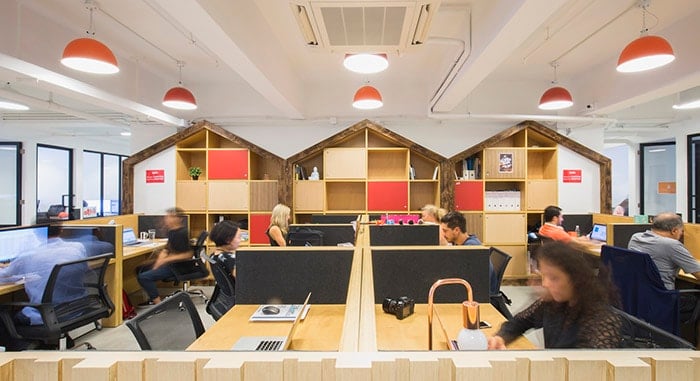 While New York-based quest for a $40 billion valuation in its next upcoming financing round has focused global attention on co-working, the greatest growth for the shared office sector is coming from Asia, where the supply of flexible-term offices providing hot desks, free beer and cappuccino machines is growing nearly forty percent more quickly than in North America, and at nearly double the pace found in Europe.
While New York-based quest for a $40 billion valuation in its next upcoming financing round has focused global attention on co-working, the greatest growth for the shared office sector is coming from Asia, where the supply of flexible-term offices providing hot desks, free beer and cappuccino machines is growing nearly forty percent more quickly than in North America, and at nearly double the pace found in Europe.
“From 2014 to 2017, flexible space stock across the region recorded a compound annual growth rate of 35.7% in Asia Pacific—much higher than in the United States (25.7%) and Europe (21.6%) over the same period,” property consultancy JLL reported in a study released earlier this month. “The number of major flexible workspace operators in Asia Pacific more than doubled as did the overall stock of floor space.”
In its report, Spotting the Opportunities: Flexible Space in Asia Pacific, JLL’s Susan Sutherland, Christopher Clausen and Ankita Prasad find that Asia Pacific reached an “inflexion point” in 2016–17, when international players such as WeWork entered the Asia Pacific market while local rivals including Beijing-based Ucommune, Singapore’s Justco and Hong Kong’s Campfire rapidly sprung up to challenge the US giant in the race to meet tenant demand for flexible office space.
World’s Priciest Office Market Makes Space for Co-Working Operators

JLL’s Susan Sutherland
Once the province of tech startups and solo entrepreneurs, shared space providers are making rapid inroads even in the region’s biggest banking hub, with Knight Frank noting the growth of co-working in Hong Kong’s core business areas, where office values have about doubled since 2011.
“Lack of space in Central coincides with the time when Mainland co-working space providers vie for dominance in the large-floor-plate segment of the markets,” reported Knight Frank in the June issue of its Hong Kong Monthly report. “The most notable example is when Kr Space rented seven floors of One Hennessy Road in Wan Chai, with a total lettable floor area of 84,000 square feet for HK$79 per square feet per month,” the brokerage added.
Nor is Kr Space re-renting space to fly by-night start-ups, or iffy venture-capital dreamers, said Knight Frank. “Kr Space is targeting Mainland financial and technology forms coming to Hong Kong.” The mainland influx into shared space will “not only put pressure on rents in the vicinity of Central, but will also fundamentally transform the demand dynamics of the Hong Kong Grade-A office market,” boldly declared Knight Frank.
Money is the Root Of All Sharing
The idea of shared, or co-working office space, until recently the preserve of start-ups, the hip or the budget-strapped, now has become one of defining trends even in prime business districts of the region’s largest cities, with the trend increasingly driven by corporate occupiers looking to reduce rental expenditures.
“Cost savings from using a co-working space is the most apparent in the (Singapore) CBD, where savings can amount to approximately 50 percent as compared to a traditional office space,” noted Singapore’s Edmund Tie & Co. property consultancy in its recent report, Co-Working Space: An alternative to offices. Much of the savings is due to the shared office spaces creating greater density by locating team members in common areas, or substituting wall mounted tables for desks, rather than accommodating staff in offices or even cubicles.
Incorporating Flexible Space into the Corporate Footprint

Windowless rooms with tables attached to the wall can now be leased at a premium
For the corporates, shared space is not only cheaper, but offers flexibility in staffing up or down with business undulations, Edmund Tie’s report noted. “Contrary to popular belief, more than 50 percent of co-working memberships are subscribed by MNCs. Co-working spaces offer companies flexibility in lease terms, which in turn help corporates manage the fluctuating staff members amid economic uncertainties and project-based work.
For instance, HSBC in Hong Kong has taken up some 300 hot desks at WeWork. In Singapore, to prepare for their new co-working space in Paya Lebar Quarter, Lendlease has moved about 100 staff into The Work Project at OUE Downtown. Other companies that have subscribed to co-working spaces include Facebook, IBM and Microsoft. “
Many corporates will use both traditional and shared space in the future, predicted JLL. One client told JLL it may develop a “spoke-and-hub” system of offices, with traditional space at the core but shared spaces on many spokes. Obviously many corporations have a need to promote their brand, culture and loyalty, and for privacy and security, best done in conventional space, noted JLL.
Still, office tower landlords will migrate to routinely offering shared space within their structures, much as gyms or food courts operate today to enhance desirability for tenants, said JLL.

Leave a Reply